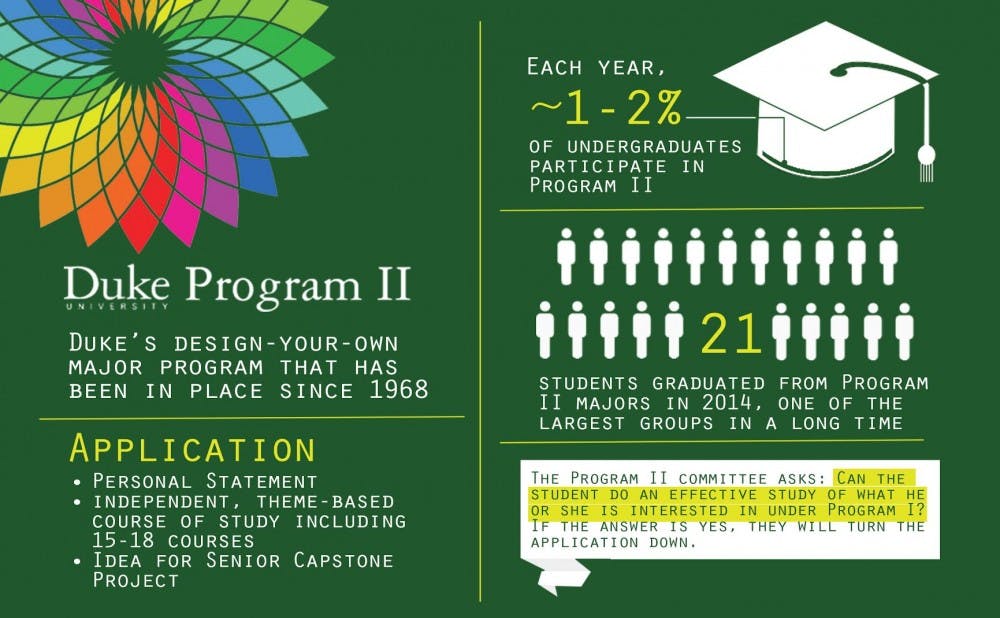Although most students choose traditional majors like economics, public policy or biology, there is a lesser-known option for those who desire a more personalized area of study—Program II.
Program II is essentially Duke’s design-your-own major and has been in place since 1968. The 12 to 18 undergraduates per year who follow this path must submit an extensive application outlining an independent, theme-based course of study, including a senior capstone project. Instead of being based in a single discipline—as most Program I majors are—Program II uses themes to focus study, said Norman Keul, associate dean and director of Program II.
“Once you have a clearly defined theme you want to explore as an undergraduate, you cherry-pick courses that allow you to get at and explore that theme most effectively," Keul said.
Students generally participate in Program II when they cannot study what they want to study under the standard Program I majors, explained Keul.
“The most fundamental question asked by the Program II committee when reviewing an application to Program II is whether a student can do an effective study of what he or she is interested in under Program I,” Keul said. “If the answer is yes, then we will turn the application down.”
Elle Wilson, a junior in Program II who is studying consumer markets and behavioral decision theory, initially did not anticipate pursuing a Program II major.
“I was confident that after taking a few introductory classes in a broad range, one area of study was bound to stand out from the rest,” Wilson said. “Interestingly, the opposite happened.”
A tiny portion of undergraduates participate in the program each year—about one to two percent of students. Last year, 21 students graduated from Program II majors, one of the largest groups in a long time, Keul said. But the number fluctuates from year to year depending on various trends.
“The big trend that just ended is global health,” Keul said.
Although the growth of interest in global health brought a large group of students to Program II, it also influenced the creation of a new major—the global health co-major that began Fall 2013.
“One of the features that is very interesting about Program II is that it is a crucible, a place where new trends and ideas are explored,” Keul said. “If they prove to be of sustained interest, then the faculty departments will recognize this and decide if they want to incorporate it into their regular offerings and make it a major.”
Previous examples of common Program II areas of study include neuroscience and architecture. Like global health, both of these were turned into something students could study more easily under Program I: a major in the case of neuroscience and a concentration under the art history major in the case of architecture.
Due to the personal nature of the program, close relationships with faculty are inevitable for students who complete Program II.
“There’s a kind of intimacy with faculty,” Keul said. “There’s no way you could put together a Program II without having interaction and conversation with faculty, and that’s a great thing.”
Wilson works closely with her Program II advisor Dr. Peter Ubel, a professor with appointments in business, public policy and medicine. She said she hopes to participate in research alongside Ph.D. students under his supervision.
Students who participate in Program II must have a high level of motivation and intellectual drive to complete the extensive application process, which includes a personal statement and an idea for a senior project as well as a list of 15 to 18 courses which pertain to a student’s plan of study.
“Once it’s done, students are studying what they’ve created for themselves,” Keul explained. “The intellectual commitment to what you’re studying is very profound, and I think students really invest because they’re investing in themselves.”
Wilson said she produced multiple 10-page drafts in the application process in order to have her academic program approved. Although the requirements are rigorous, students passionate about pursuing a Program II degree are not deterred.
“I love that Program II gives me the option to deeply study what I’m truly interested in,” said sophomore Evan Bell, who is considering a Program II major. “Although the application process is a bit daunting, I’d rather undergo it than settle on a major that I’m not passionate about, simply because it’s there.”
Get The Chronicle straight to your inbox
Sign up for our weekly newsletter. Cancel at any time.

